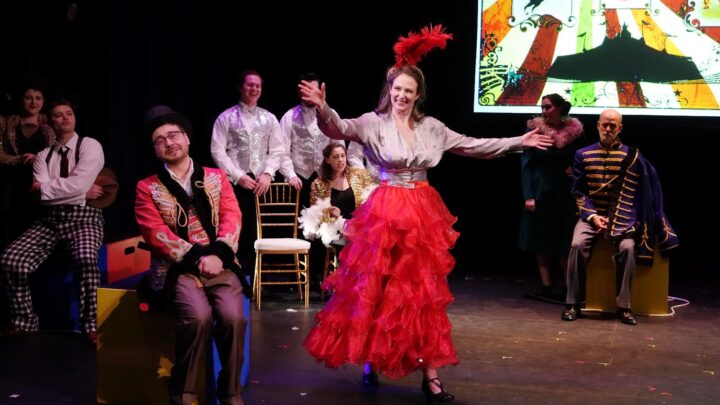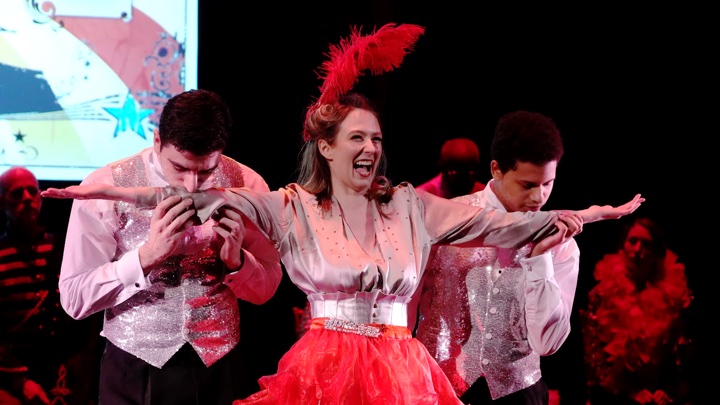
Tthe publisher of the magazine, Kendall Nesbitt, is divorcing his wife for her and movie star Randy Curtis is simply desperate to take her out for drinks. By the end of the show, her incessantly insubordinate marketing manager Charley Johnson emerges at the top candidate—he may be a workplace sexual harasser, but he does know the answer to the song riddle.
Liza’s real breakthrough isn’t romantic but therapeutic. With analyst Dr. Brooks (Leslie Swanson), Liza connects painful childhood memories with her current state of indecision, and in the climax of her narrative, remembers the words to the earworm that has tormented her and finds a place for it in the larger context of her life.
Last weekend, Bronx Opera wisely stopped short of having Liza and Charley end in a definite romantic attachment; instead, stage director (and general director) Benjamin Spierman massaged the ending to be more about her needing to find an intellectual equal at work, someone who challenges her and sees her more clearly as a capable, sensitive person.
It’s too bad for Spierman and for baritone Will Kellerman, who tried valiantly to wrest some charm from Charley’s character, that to modern ears, all of Charley’s lines feel like immediate grounds for termination and maybe a Title IX report, not for a promotion and potential promise of romance.
Small companies like BxO exist, in part, to give opportunities for young singers to hone their craft, and thus a bit of unevenness is to be expected, especially when singers trained for one genre move to another. The music contrasts its lengthy musical dream sequences, which pack three or four songs into a stretch (all music is part of either dream or flashback) with equally lengthy stretches of dialogue.
This fact makes Lady somewhat a challenge; very few opera singers pull off extensive dialogue well, and the gap between the styles of acting between opera and musical theater can be as wide (or as narrow, depending on the piece) as that between the musical styles. Weil’s score doesn’t allow the characters to really sing all that often, however (with the exception of Liza and the chorus, who has plenty to do), with the result that the show relied too heavily on the cast’s dramatic abilities, and not enough on their vocal ones.
Sunday’s cast were hampered by the talkiness—some over- and others under-acting their ways through it—and by being unamplified, which made it hard to hear their speech.
Perri di Christina, as Liza Elliot herself, lent a rich and surprisingly dark sound to this anxious and indecisive heroine, imbuing the character with welcome depth and grounding her more firmly. While the score did not often give her a chance to bust out her real mezzo chops, which seem well suited to bel canto material, she found moments to relax and let her voice do the dramatic work.
As Russell Paxton, baritone Vince Gover (who, in the spirit of transparency, was a classmate of mine back in my Dallas days, and he was one of our finest actors then) was a comedic stand-out, especially in the dialogue which had a tendency to drag without his witty and well-pitched timing. His patter song, “Tchaikowsky (and other Russians)” was another highlight, with Gover bounding about the stage in full Ringmaster garb and spitting Russian (or Russian-ish) names with glee at lightning speed.
Other delights included mezzo-soprano Erin Rose, who simply oozed charm and energy as flirty secretary Miss Foster, and soprano Samantha Lax, who played Liza’s friend and coworker Maggie Grant with a mix of warmth, protectiveness, and a few attempts at flirting of her own. Benjamin Hoyer as Kendall Nesbit and Miguel Pedroza as Randy Curtis rounded out the major cast as the other two competitors for Liza’s heart.
What struck me most about BxO was the spirit amongst the audience the audience and the staff. Spierman cracked jokes in his opening speech, and more or less addressed the auditorium as if we were all in it with him; I felt like a member of the cast, and it also felt like the audience knew each other and were regulars at the Lehman auditorium.
In other words, BxO felt like community theater, in the best sense of that word—opera that is embedded in and intended for its community (BxO also does admirable outreach work in schools in the Bronx). It’s exciting to see singers who are still at the beginnings of their careers; voices and stage presences are still settling, but the raw material is all there.
BxO includes in their program the Met debut dates for many of their alumnae, which span back over their 50-year history. The message is clear: We’ll surely hear more from these singers soon.




